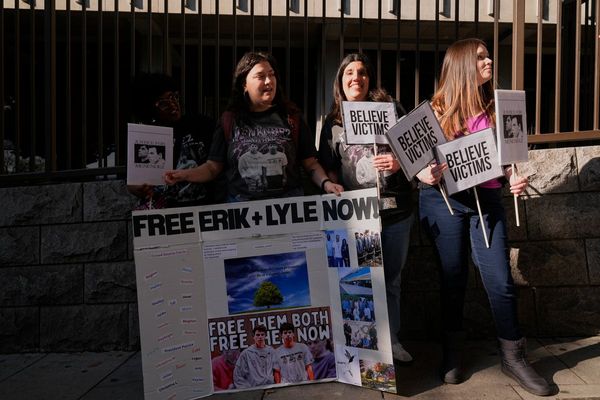Some CEOs eye a life of leisure after their companies are bought. Not Motorola Solutions CEO Greg Brown — he sought his next corporate challenge instead.
Brown was living in Chicago when IBM bought the company he was leading in 2003: Micromuse. But before the ink was dry on the buyout, he knew what he wanted to do next.
And what he saw was Motorola (later renamed Motorola Solutions), a former wireless communications champion in town struggling to evolve.
"I looked at Motorola as a challenged American iconic brand, but one that had a history of innovation and a long-standing, proud tradition," Brown, now 62, told Investor's Business Daily.
Find A Challenge
Brown figured that skills he picked up as Micromuse's CEO could apply to Motorola. But he had to get a job there first.
He wasn't a shoo-in for the job. He called Chris Galvin, a grandson of the founder, "and told him I wanted to join the company." Brown even knew the job he wanted — president of communications, government and industrial solutions. That was one of six divisions at the company.
But Galvin was skeptical. "He said, 'Why would you want to go from a public company CEO backwards to a division president?' I told him I don't look at it as backwards. Motorola is much larger, much more iconic. I look at it as a great opportunity," Brown said.
Rise Through The Ranks
Brown got the job in 2003 and rose fast. The company promoted him to chief operating officer in 2007 and CEO the following year.
Great career advancement. But lousy timing. In 2007, Apple introduced the iPhone, which soon made Motorola's vaunted Razr flip phone obsolete. In 2008, the Lehman Brothers bankruptcy set the economy into a tailspin. And, in 2007, activist shareholder Carl Icahn purchased a stake in the company.
Brown didn't have good luck. But he had a plan. So in the first 90 days, he made several important decisions.
He fired the head of the cellphone business and got the board's approval to spin off the unit. That helped him reach an accord with Carl Icahn. On the surface, much of what Brown proposed was radical. In fact, there was no choice.
The cellphone business was "losing $300 million to $400 million a quarter," and because of that, "Motorola was on a path toward bankruptcy in two years," Brown said. So coming up with this solution wasn't difficult. But executing it was.
Giving Icahn seats on the board helped. The activist supported the changes. "He's a stimulant for change, and I've said before: I'd rather have him inside the tent p***ing out than outside p***ing in."
Ironically, getting rid of the cellphone business meant first working to improve it, "stabilizing that business and taking it from losses to break-even." It took time, but in April 2011, since renamed Motorola Solutions sold its cellular infrastructure business to Nokia for nearly $1 billion.
Deal With Internal Struggles
Still, not all was copacetic. There were rumbles from within Motorola Solutions' ranks. The company's "growth had stalled, and I was told a lot of people weren't on board with my strategy," Brown said.
Part of the discord was resistant to Brown as an outsider. Motorola was a company that traditionally "promoted from within, offered lifetime employment and tried to build a 'we're a family' atmosphere," he said. "And a lot of what I stood for and did was incompatible with the legacy culture."
Some might have tried to ignore the friction, conduct team-building games and forge ahead. Not Brown. He met the trouble head-on.
"(In 2014) I called a meeting of the company leadership," he said. He showed them the financials in the bleeding years before he took over. And then the far better results since.
And he told them: "I don't think the problem is necessarily me. The problem could be more you. Here are the metrics we're going to measure success by, and you either have to commit or quit."
Brown gave the top brass little time to decide which it would be. "And you've got to do one of them today, because we're not going to have this bull**** going forward," he said.
Hold Others Accountable
Did it work? "It seemed to," Brown said. "I'm not saying one meeting was all it took, that all the negativity flew out of the building, and the world changed."
But it was just a start, not a pat-yourself-on-the-back-moment.
"There was never one moment like that. But I think over time as we watched the total shareholder return outperform the market a lot. And we were getting better recognition, financially, strategically, culturally. Yeah, that was satisfying."
Shares of Motorola Solutions are up 340% in the past 10 years, outpacing the S&P 500's 136% rise in that time.
Find Your Niche
Brown's prescience was recognizing the company's potential market. It was far larger than many thought. Motorola could carve out the part of the communications equipment business supplying to police, fire and medical emergency service units around the world. And it paid off.
Growth regularly outpaced the market — and continues to do so. The company's earnings per share is on pace to hit $11.49 a share this year, says S&P Global Market Intelligence, up 197% from 10 years ago.
"I thought of (the market) just as public safety and enterprise security ... but it was also video security, video surveillance," he said. "It's a $60 billion market today and that market is going to do nothing but grow."
Make The Tough Calls
Carving out a niche seems like an obvious move in hindsight. But at the time it was a departure from the company's comfort zone. Acquisitions fueled the shift. Overall, Motorola Solutions has done more than 40 deals over the last dozen years. All told, they added $3 billion in annual revenue to the company's bottom line.
Mahesh Saptharishi, Motorola's executive vice president and chief technology officer, credits Brown for shaking up the company and putting it back together in better shape.
"What Greg has done very successfully is to actively look to change the organization and push us out of the sense of comfort really and push into the realm of discomfort," Saptharishi said. "It takes boldness to do that."
Buy Size, But Prudently
Brown has a clear notion of what makes a good acquisition target. "We have the expertise to make these companies grow faster inside Motorola than they would on their own," he said.
Acquisitions at Motorola Solutions are a team effort, he says. "The sales team, the finance team, the operational integration team, we're all one," Brown said.
Brown points to three acquisitions that have been key to the company's growth. The first, Avigilon, cost $1 billion in 2018. It was the company's "first foray into an adjacent space: public safety, video security."
More recently, acquisitions of Openpath Security and Rave Mobile Safety have expanded the company's reach and capabilities.
See A Bold Future
What is Brown's ultimate vision for Motorola Solutions? Imagine a security guard sitting in a room watching scores of monitors eight hours a day. Motorola now offers AI capabilities that watch all those screens and alert guards to any anomalies.
But Brown isn't just gaining new products by buying companies. He's picking up top people, too. CTO Saptharishi joined as part of the Avigilon team. Alex Kazerani, founder and CEO of Openpath, and Todd Piett, former CEO of Rave, are now corporate vice presidents.
Asked what advice he'd give young executives, Brown takes an almost meditative approach.
"I think younger people worry too much about the master plan," he said. "The place to succeed is where you are, not where you want to be. Be present."
Greg Brown's Keys
- CEO of Motorola Solutions since 2008, taking the company bound for bankruptcy into profitable new directions.
- Overcame: Difficulty of staying in touch with the troops from a perch in the C-Suite.
- Lesson: "I stay as accessible as I possibly can."







